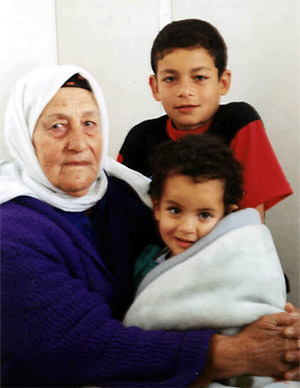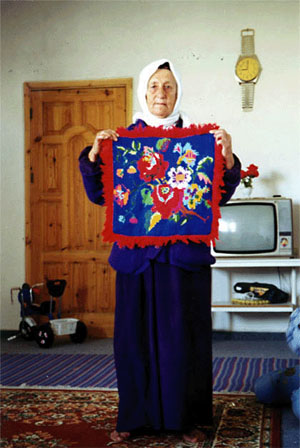
Umm al-'Abed Shahada with two of her grandchildren.
|
 Umm al-'Abed Shahada with two of her grandchildren. |
| Umm al-Abed Shahada, Rafah camp, April 7:
|
|
A friend at Birzeit who had worked with Andalib 'Adwan recommended her to me. Andalib was then deputy director of the WATC (Women's Activity Training Centre) branch in Gaza, a very bright woman, her advice made richer by her own experience as a researcher. She and her husband, film-maker Abdel Salam Shahada, were originally from Rafah camp. With the biggest Muslim feast of A'eed al-Adhar coming up, they invite me to spend the feast in Rafah with their families there. There is no way into any camp except through such personal introductions, so I gladly accept.
Rafah camp is in the southernmost part of the 'Strip'. If you look from any rooftop in the camp, you can see the barbed wire fence that marks the no-man's land between Gaza and Egypt, regularly patrolled by Israeli armed vehicles. You can also see the settlements that surround Rafah like the look-outs of a besieging army. There is one narrow outlet, a few meters wide, through which Rafah people can reach the sea. Israeli settlers have taken miles of the best Gazan coastline for tourist resorts. Abdel Salam's family - his mother and three brothers with their wives and children - live in Tel al-Sultan, a recently built part of Rafah camp. Houses here are self-built, with financial help from the Canadian government. Residents say that after the Israelis leave, the Palestinian state will recognize their rights as home-owners. Umm al-Abed, Abdel Salam's mother, lives mainly with her oldest son but spends much of her time in the other two homes next door. It's hard to count her grandchildren - this A'eed there are at least 30 of them here, including the visitors from Gaza city. Almost the first words that Umm al-Abed says to me when we first meet is - pointing angrily at her flock of grandchildren - "They're all girls!" Because it's the A'eed, Umm al-Abed is carrying a small velvet purse in which she puts gifts from her sons. One of them has not given her anything this year, and she complains to me bitterly that he's 'jiggin' and 'kisher' (frowning, unfriendly). She asks me if my sons remember to give me gifts? I say, "Sometimes they do. Hassab (it depends)". I feel that this story about sons who do and don't remember mothers is something I share with her and other older Palestinian women. I've always felt drawn to them since I first began doing anthropology in Palestinian refugee camps, in 1973. |
I take immediately to this hawk-faced old woman, restlessly energetic, who never stops talking and moving and complaining, She decides that I should stay in the home of the youngest daughter-in-law, because it has two modern bathrooms. She moves her mattress to sleep next to me, a hospitable custom I'm familiar with from Shatila camp (Lebanon). There, whenever I stayed with my closest friend, Umm Mustafa, she always used to leave the marital bed to sleep beside me on the floor of the TV/study room,
In fact, Umm al-Abed is so lively that I don't sleep much during this visit. She has a long Gallic face, with grey-green eyes, and reddish skin - as if descended straight from Crusaders. She, too, is curious about me - my age, my husband, my children, and why I'm wandering about so far from home. Yet it's curiosity, not suspicion, that drives her questions. The fact that I came with Abdel Salam and Andalib transforms me from a stranger into - what? Not one of the family, more like an exotic pet. Umm al-Abed had left her village Barbara in Southern Palestine in 1948, and had lived ever after in Rafah camp. To narrow down the 'universe' of speakers, I had decided to record only with people who had been made refugees more than once. But women of her generation, those who had grown up in Palestine, always tempted me to break my rules. Soon no one will speak their language, with its fascinating specificities of locality, gender, generation, class and culture. Umm al-Abed's story is quite different from Umm Sa'id's, revolving tenaciously around bits of property in Rafah to which she or kin had claims, with conflicts arising from the terrible pressure of people on space. From her I understand how displacement produces this also - an obsession with the idea of a stable home that fills the mind and soul, driving out everything else. Umm al-Abed begins her story:"Bismillah al-rahman al-rahim. When I married I was still young (ignorant). I was (bidiri?), I was a child, my 'exchange' was ten years older than me [an 'exchange' means her brother's wife, sister to the man to whom she was given as wife]. My father said, "I don't want to give my daughter to this man who is 15 years older than she is". But my mother said, "No, we don't want to upset the exchange. Khelas, she's his lot and he's her lot..." |
 |
|
[Lily Saba] [Umm Jammal Bakiyya] Copyright©2005 |
|